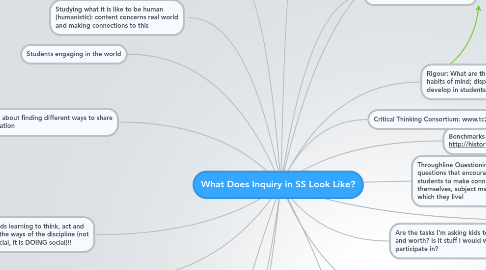What Does Inquiry in SS Look Like?
저자: Mandy L'Abbe

1. Inquiry: Based on what you think/know about a topic
2. Inquiry: Based on the types of questions you ask
3. Students engaging in the world
4. Studying what it is like to be human (humanistic): content concerns real world and making connections to this
5. Inquiry = disposition towards the topic you are teaching
5.1. New node
6. Not all about finding different ways to share information
7. IS about kids learning to think, act and behave in the ways of the discipline (not ABOUT social, it is DOING social)!!
8. Inquiry: How you relate to/listen to your kids
9. Globally minded
10. Metacognitive Thinking
11. Benchmarks of Historical Thinking: http://historybenchmarks.ca
12. Critical Thinking Consortium: www.tc2.ca/wp/
13. Rigour: What are the ways of thinking; habits of mind; dispositions we want to develop in students through Social Studies?
14. Apprenticeship model of teaching
15. Bring kids into topics we find interesting, controversial and contentious
16. Good Teacher = have students who produce work worth doing with lasting value
17. Are the tasks I'm asking kids to do of value and worth? Is it stuff I would want to participate in?
18. Throughline Questioning: Asks provocative questions that encourage teachers and students to make connections between themselves, subject matter, and society in which they live!
19. SOCIAL STUDIES can encourage students to critique society, being aware of what is going on and having a voice in it!!
20. Multiple Perspectives
20.1. New node


